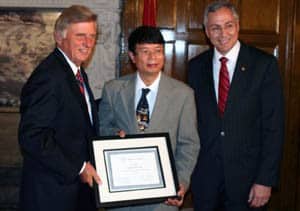World-Renowned Cancer Researcher Joins UAMS
July 7, 2010 | Arkansas Gov. Mike Beebe today declared the recent addition of a world-renowned University of Arkansas for Medical Sciences’ (UAMS) researcher a “home run for economic development in the state.” Daohong Zhou, M.D., a professor in the Division of Radiation Health of the UAMS College of Pharmacy’s Department of Pharmaceutical Sciences, was one of two celebrated researchers the Arkansas Research Alliance (ARA) announced as its inaugural ARA Scholars, which includes $500,000 of funding for him and his team. Ranil Wickramasinghe, Ph.D., professor in the University of Arkansas at Fayetteville’s Department of Chemical Engineering in the College of Engineering, is the second. “Dr. Zhou will have an immediate impact on the research infrastructure within the state of Arkansas,” said UAMS Chancellor Dan Rahn, M.D. “He is an accomplished scientist with a strong international reputation in the field of radiation biology. We have high expectations for Dr. Zhou and his staff and anticipate that they will strengthen a developing research group focused on radiation-induced tissue surgery.” Formed from funds appropriated by the state Legislature and authorized by the Arkansas Science and Technology Authority in 2007, the ARA aims to strengthen economic development in the state by championing university-based research and innovation in defined strategic focus areas. A news conference was held at the State Capitol today to announce the two inaugural ARA Scholars, who were chosen through a rigorous vetting and review process conducted by an external advisory committee. “Our new scholars are a great addition to Arkansas’ research leadership and talent,” said Jerry Adams, ARA president and CEO. “By recruiting our first two scholars, we are gaining momentum and we look forward to collaborating with all of our statewide research universities.” The ARA Scholars Program, modeled after the success of the Georgia Research Alliance, recruits highly respected thought leaders with the goal of adding value to existing research programs through collaboration, innovation, and eventually commercialization, which is the “economic development component that will lead to more jobs and successful businesses in our state,” Beebe said. Rahn, recruited from the Medical College of Georgia last year, has seen firsthand the success of that state’s program, which has recruited 63 scholars and proven itself an economic generator. “Those researchers have taken about $525 million in state funding and turned it into more than $2.6 billion in additional federal and private investment,” Rahn said. “In addition, more than 150 new companies have been created. We think that can happen in Arkansas and are taking the first steps toward that today with our first two scholars.” Zhou’s research focuses on radiation biology and normal tissue response to cancer therapy. He previously served as a professor of pathology and an adjunct professor of radiation oncology at the Medical University of South Carolina (MUSC). Since 2007, he has served as director of the Flow Cytometry Facility at Hollings Cancer Center at MUSC. He is a graduate of Yunyang Medical College in Hubei, China, and completed his internship at the college’s Affiliated Hospital and postdoctoral training at Johns Hopkins University School of Medicine. Zhou is the principal investigator for three Research Project Grants (RO1s) and two American Recovery and Reinvestment Act administrative supplement grants from the National Institutes of Health (NIH) totaling almost $4 million to examine radiation-induced injury to bone marrow. He is a charter member of the NIH Radiation Therapeutics and Biology Study Section and a member of the International Society of Stem Cell Research, the American Society of Hematology, the International Society of Experimental Hematology and the Radiation Research Society. |


